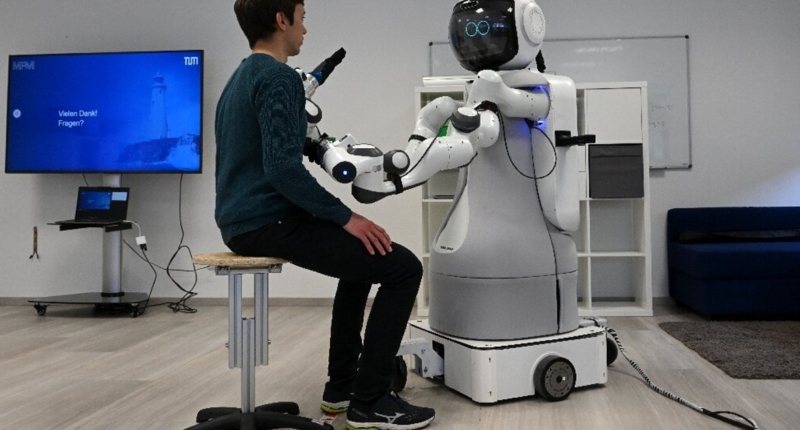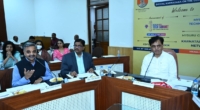Researchers at the Munich Institute of Robotics and Machine Intelligence have developed a humanoid robot called Garmi, a product of a new sector called geriatronics, which is using advanced technologies for geriatrics, gerontology and nursing. Garmi can perform diagnostics, provide care and treatment, and offer personalized help to elderly patients. The robot can be controlled remotely, and medical data is immediately visible on a doctor’s screen. The researchers are hoping to develop a technology hub where people can receive medical examinations, and robots can take over some of the tasks carried out by healthcare workers. However, gaining patients’ trust in robots is a significant challenge, and the engineers will have to address that to get them to accept the robot. For Garmi to be deployed on a commercial scale, it will need patient acceptance. With Garmi’s development, the shortage of healthcare workers in elder care can be addressed, and it could allow staff to spend more time with the residents.

Robots for Elder Care: Germany Taps Advanced Technologies
Germany is facing a severe shortage of healthcare workers, particularly in elder care, as the country’s population rapidly ages. As a result, researchers at the Munich Institute of Robotics and Machine Intelligence, part of the Technical University of Munich, have developed a robot called “Garmi” that can perform various tasks carried out by nurses, caregivers, and doctors.
Garmi is a humanoid robot with a white-colored body and a black screen acting as its eyes. It can perform diagnostics, provide care, and offer personalized help such as serving meals, drinks, and organizing video calls. This robot is the product of a new sector called geriatronics, which combines advanced technologies like robotics, IT, and 3D technology for geriatrics, gerontology, and nursing.
Scientists, along with medical practitioners like retired German doctor Guenter Steinebach, helped build Garmi. They are working to develop robots that can take over some of the tasks carried out by healthcare workers, given the estimated 670,000 caregiver posts that will go unfilled in Germany by 2050.
The researchers hope to create a technology hub where people can come for their medical examination and evaluations can be done remotely by doctors. Alternatively, the machine could offer personalized services at home or in care homes, making it easier for elderly people to live more independently.
With the use of robots in elder care, the shortage of healthcare workers can be addressed, and the country can better serve its rapidly aging society. “We must get there,” says Abdeldjallil Naceri, the lead scientist of the lab.
At the Garmisch laboratory, Steinebach tested the robot’s progress, sitting down at a table equipped with three screens and a joystick. For him, this robot is a dream come true, and it could be a step forward in the future of elder care.
The Future of Elder Care: Germany Taps Advanced Technologies for Patient Diagnosis and Treatment
Researchers at the Munich Institute of Robotics and Machine Intelligence have developed a humanoid robot named Garmi to help address the severe shortage of healthcare workers in elder care in Germany. Garmi can perform various tasks like diagnostics, providing care and offering personalized help to elderly patients. It is the product of a new sector called geriatronics, which taps advanced technologies like robotics, IT, and 3D technology for geriatrics, gerontology, and nursing.
Medical practitioners, including retired German doctor Guenter Steinebach, collaborated with the scientists to develop the robot. The researchers hope that Garmi can take over some of the tasks carried out by healthcare workers given the estimated 670,000 caregiver posts that will go unfilled in Germany by 2050.
Garmi can be controlled remotely via a joystick, and diagnostic readings are gathered from the patient via a stethoscope attached to its body. Medical data appear immediately on the doctor’s screen. Other medical practitioners visit the lab regularly to provide their feedback on the robot’s development.
However, getting patients to trust robots is a significant challenge. “They need to trust the robot,” says lead scientist Abdeldjallil Naceri. “They need to be able to use it like we use a smartphone today.” For Garmi to be deployed on a commercial scale, most patients must accept it.
The researchers aim to create a technology hub where people can come for their medical examinations, and evaluations can be done remotely by doctors. Alternatively, the machine could offer personalized services at home or in care homes, making it easier for elderly people to live more independently.
Mrs. Rohrer, a 74-year-old resident at the Sankt Vinzenz retirement home in Garmisch, which is a partner of the project, said, “There are things that a robot can do, for example, serve a drink or bring meals.” Eva Pioskowik, the director of the home, does not expect the robot to take the place of health workers, but rather allow staff to spend more time with the residents.
Naceri is convinced that “we must get there” and integrate this kind of technology into society by 2030.
Don’t miss interesting posts on Famousbio










